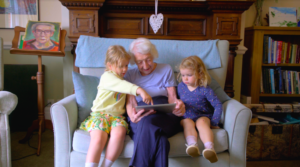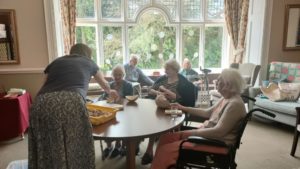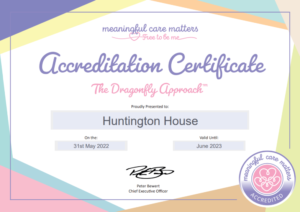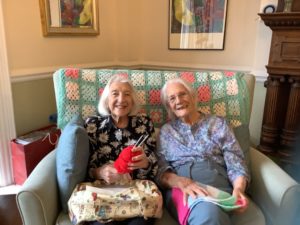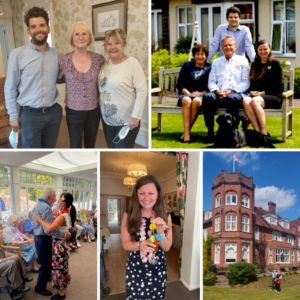Parkinson’s is a condition we’re familiar with at Huntington and Langham. As something we deal with on a daily basis, the effects on both the individuals and their families are not always widely understood. This is something we endeavour to change…
Providing support to those who need it is of utmost importance to us, be it in the form of nursing care within our home or helpful advice for those who need it most. And so, we sought a little help from our friends at Parkinson’s UK to delve a little deeper into how living with Parkinson’s can affect you or someone you love. The leading charity for Parkinson’s, offering support for those living with Parkinson’s, their aim – much like ours – is to help those with Parkinson’s improve quality of life.
Combining this expert insight, with our practical knowledge of managing Parkinson’s, we’ve created a series of articles to help you provide the best support you can to those who need it most.
What is Parkinson’s?
Parkinson’s is a progressive neurological condition for which there is currently no cure. It’s the fastest growing neurological condition in the world, and currently there are around 145,000 people living with Parkinson’s in the UK.
Common symptoms include slowness of movement and muscle stiffness, but there are over 40 symptoms and it affects everyone completely differently.
Some of the less well-known symptoms include:
– Stress and anxiety
– Chronic pain and fatigue
– Loss of smell
– Changes in digestion or sleep
People with Parkinson’s lack a chemical called dopamine, because specific nerve cells inside their brain have died. Dopamine allows messages to be sent to the parts of the brain that coordinate movement.
For those living with Parkinson’s, this means that parts of their brain are unable to work normally. They may find that movements become slower, so it takes longer to do things. This can make everyday activities, such as eating, getting dressed, and using a phone or computer difficult or frustrating.
What’s the link between age and diagnosis?
Parkinson’s can affect anyone at any age. There are around 1,750 people under the age of 50 who have young onset Parkinson’s, but the majority of people will be diagnosed over the age of 60.
How can someone living with Parkinson’s manage and cope better?
The three main treatments to help someone manage their Parkinson’s are:
– Medication
– Exercise
– Therapies
Everyone’s Parkinson’s is unique. So different combinations of medication, exercise and therapies will suit different people. We recommend people talk to their GP, specialist or Parkinson’s nurse to see what works for them. There are lots of ways to connect with people who understand what it means to be living with Parkinson’s.
To find out more, call Parkinson’s UK on 0808 800 0303. You can also join the online community on the forum, and hear other people’s tips, stories and experiences in the online magazine.
Is Parkinson’s hereditary?
It’s very rare for Parkinson’s to run in families. The vast majority of people have what is called ‘idiopathic Parkinson’s’, meaning that there’s no known cause. However, for a small minority of people with Parkinson’s, there is a genetic link.
How does living in a care environment benefit someone with Parkinson’s?
In the advanced stages of Parkinson’s, it’s likely that an individual will need extra support to carry out day-to-day tasks. This may affect their choice of home. They may decide that they could benefit from a care home or from care in their own home to help manage their condition.
A care home will offer more personal care than sheltered housing. As Parkinson’s symptoms progress and your needs increase, a move to a care home may be a necessary consideration.
How do you think activities such as fitness and activity can be of benefit?
Exercise is good for people with Parkinson’s. It can be as important as medication to help people take control of their symptoms and doing just 2.5 hours of exercise a week can even slow the progression of symptoms. However, there isn’t a one-size-fits-all approach and the best exercise to do will depend on the way Parkinson’s affects you.
How does a Parkinson’s diagnosis affect relationships and family life?
Parkinson’s may affect your self-image, mood and how you communicate with others. This may happen if you’re in a casual or committed relationship, or if you’re single. Some people have relationship issues in the early days, when they’re adjusting to diagnosis, while others may run into problems after many years of living with Parkinson’s.
Each person with Parkinson’s has their own experience of the condition. The symptoms you have may be different from other people. It’s important to remember that many people go through sexual and relationship issues at some stage in their life, so any problems you have may have nothing to do with Parkinson’s at all.
How has Parkinson’s research developed? Is a cure looking likely?
In the past 50 years, vital discoveries have been made that have revolutionised our understanding of Parkinson’s and the brain.
Now, thanks to this progress, breakthrough new treatments are being tested in clinical trials that have the potential to slow, stop or even reverse Parkinson’s.
What about family and friends?
Family and friends are often the information seekers and may focus on the person living with Parkinson’s needs rather than their own. It is important that family and friends recognise the impact of Parkinson’s on their lives and prioritise and maintain their own health & wellbeing too. It can be really valuable for family and friends to access support for themselves and connect with others in similar situations to share their experience.
How can Parkinson’s affect day-to-day life?
There is no ‘typical day’ with Parkinson’s. It is a fluctuating condition, so it can change day-to-day or for some people, hour to hour. Because of the range of symptoms involved in Parkinson’s, it also impacts on everyone with the condition differently.
With medication and small adjustments, some people are able to maintain the same standard of life they had before diagnosis for a long time. However, for some people the effects on their daily life will be considerable, for example including pain, not being able to sleep, anxiety and even being unable to move at all for short periods (freezing).
As Parkinson’s is a degenerative condition, people will see their symptoms become worse over time and respond less to medication. This means the impact on daily life will be more noticeable, and ultimately many people will eventually need regular support from health and care professionals.
A huge thank you to Parkinson’s UK for providing the answers to these questions for us. You can read Part II of our series on Understanding Parkinson’s here.

